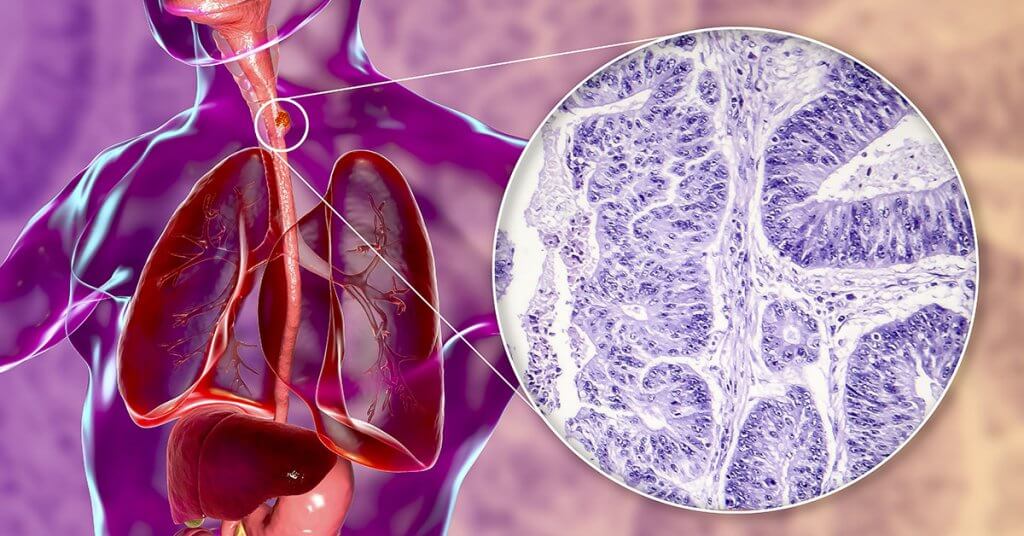8 Esophageal Cancer Risk Factors

Because April is Esophageal Cancer Awareness Month, now is the perfect time to learn more about the condition. According to the American Cancer Society, it’s estimated that more than 18,000 new cases of esophageal cancer will be diagnosed in 2020. Staying informed about your esophageal cancer risk factors can help with decision making regarding your lifestyle habits and health care choices. Being informed will also help you have honest conversations with your doctor so you can receive the right treatment.
Types of Esophageal Cancer
Most esophageal cancers are classified as either adenocarcinoma or squamous cell carcinoma. There is a third one called small cell carcinoma, but it is very rare. Each type of cancer affects different types of cells in the esophagus and requires different types of treatment.
- Adenocarcinoma: This cancer occurs in the lower part of the esophagus and the upper part of the stomach. This cancer affects mostly middle-aged, overweight, white men. Adenocarcinoma has grown faster than any other cancer in the U.S. due to the increase in gastroesophageal reflux disease (GERD). GERD is a severe form of acid reflux. Treating GERD early on can prevent adenocarcinoma.
- Squamous Cell Carcinoma: Squamous Cell Carcinoma is strongly linked to smoking and drinking too much alcohol. It begins when squamous cells – thin flat cells that line the inside of the esophagus – grow uncontrollably.
Esophageal Cancer Risk Factors
There are several risk factors to look out for regarding esophageal cancers. A risk factor is anything that increases your chances of developing a disease such as cancer. Some risk factors can be changed like diet, smoking, and exercise. Other factors like your age or family history cannot.
While you may find that you have some of these risk factors, it’s important to know that prevention is key for lowering your risk. Although you have risk factors, it doesn’t mean you will get esophageal cancer. Conversely, there are people who get the disease that have no known esophageal risk. Below are conditions that can increase your risk of developing esophageal cancer.
1. Gastroesophageal Reflux Disease (GERD)
GERD is a chronic, more severe form of acid reflux. Many people experience acid reflux but individuals with persistent acid reflux that occurs more than twice a week may be diagnosed with GERD. People with GERD also experience chest pain, sore throat, bad breath, difficulty swallowing and feel like there’s a lump in their throat. We can test and treat GERD at our Birmingham office.
2. Barrett’s Esophagus
Unfortunately, if you have GERD, there is a small risk that you may develop Barret’s esophagus. Barret’s esophagus is a potentially serious complication of GERD and is an esophageal cancer risk factor. Barrett’s esophagus occurs when chronic acid reflux damages the inner lining of the esophagus. The damage then causes the cells in the esophagus to be replaced with cells that are more resistant to stomach acids, like the cells found in the stomach and small intestine.
Although the risk of developing Barrett’s esophagus is small, it’s important to have regular checkups for precancerous cells. Birmingham Gastroenterologists are equipped to screen and treat Barrett’s esophagus. However, seek immediate help if you have chest pains, difficulty swallowing, are vomiting blood or passing black, tarry or bloody stool.
3. Achalasia
Achalasia is a serious condition that occurs when the esophageal sphincter – a muscular ring – fails to open during swallowing. This leads to food backing up inside your esophagus. This condition significantly increases esophageal cancer risk factors.
4. Age
More than 85% of cases of esophageal cancer are over the age of 55. As you age, your chances of developing esophageal cancer also increase.
5. Gender
According to the American Cancer Society, women are less likely to get esophageal cancer than men.
6. Tobacco and Alcohol
Esophageal cancer risk factors increase for smokers and people who drink alcohol. Increased use also increases the risk. Combining smoking and drinking raises the risk much more. Whether you quit smoking or not, a smoker always has an increased risk of esophageal cancer. a
7. Obesity
People who are overweight or obese have a higher chance because they are also more likely to have gastroesophageal reflux.
8. Diet
Processed meats should be avoided or limited. Drinking too many hot liquids can result in long-term cell damage in the esophagus that can lead to cancerous cells.
Lowering Your Risk
While there is no way to prevent esophageal cancer, there are things you can do to lower your risk.
- Make healthy decisions
- Quit smoking. Smoking is linked to many cancers, including esophageal cancer.
- Stop drinking, or reduce the amount you drink.
- Consult with your doctor if you are experiencing acid reflux or heartburn.
- Regularly exercise and avoid becoming overweight.
- Prevention is key. Consider booking an appointment to get screened for conditions that can lead to esophageal cancer.
- Take your daily vitamins. Esophageal is linked to deficiencies in beta-carotene, vitamin E, selenium and iron.
Consult with your gastroenterologist if you are experiencing any symptoms mentioned. We will be able to test and help treat your symptoms. We have decades of experience treating diseases and disorders in all parts of the digestive system. To make an appointment to discuss your symptoms and treatment options, call us at (205) 271-8000.

